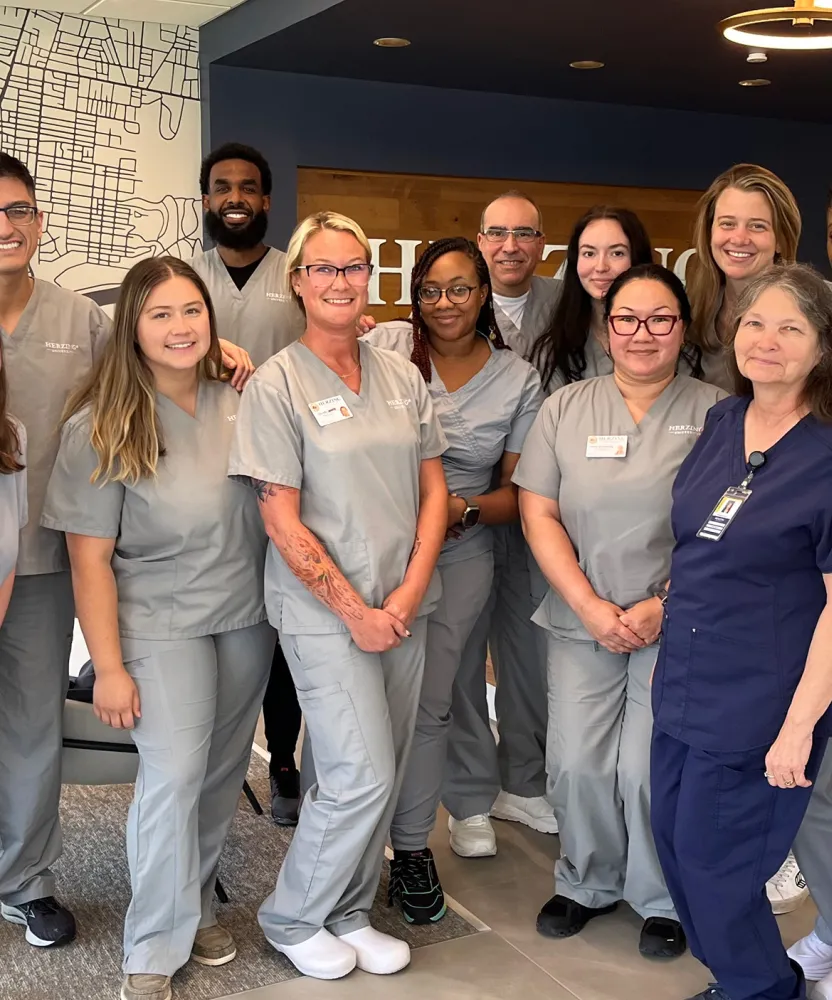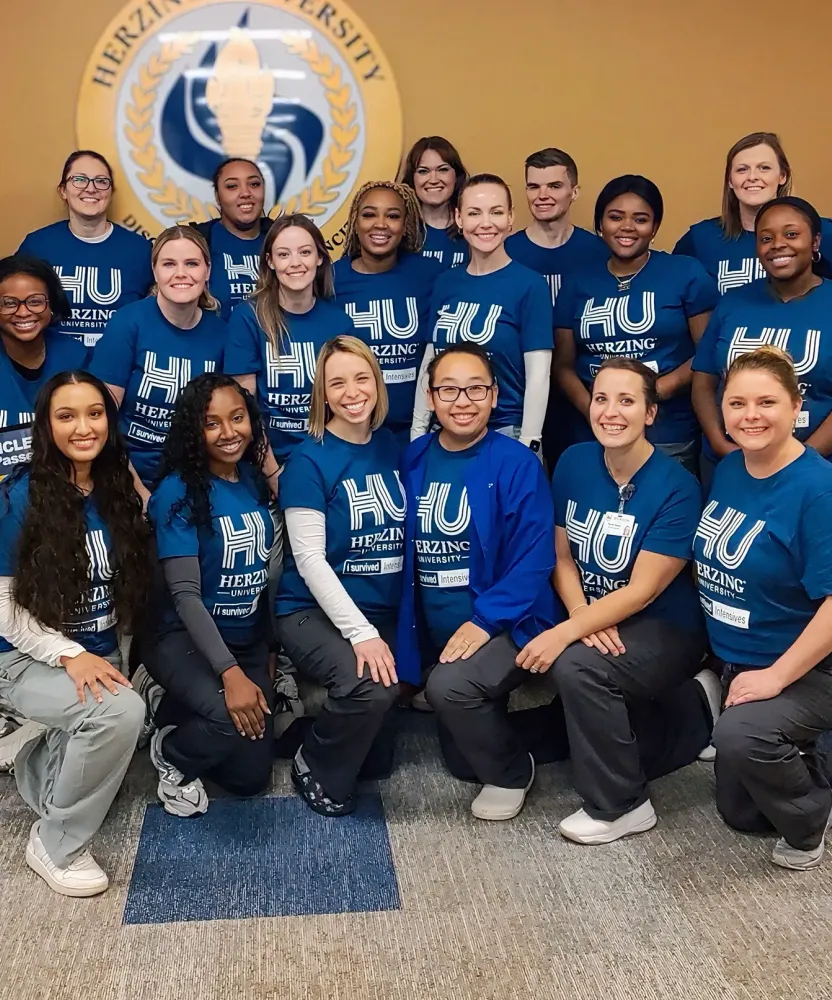Quick facts about our online BSN program
| Accreditation | CCNE accredited,1 Accredited by the Higher Learning Commission |
|---|---|
| Program length | 3 years or less when attending full-time and depending on transfer credit; you can transfer up to 90 approved credits |
| Prior experience | Designed for students without RN experience |
| Format | All core didactic (lecture) courses are delivered online, including real-time and on-demand courses you can take when it’s convenient for you |
| Hands-on prep | Hands-on learning includes on-site clinicals and three intensives requiring attendance at a designated Herzing or partner site |
| Eligibility | Available for enrollment in select states2 |
| QuickPaths | Discover a quicker path to advance your career with Herzing University: options include earning dual credit towards an MSN, or an alternative online MSN Direct Entry program for non-nurses with a bachelor’s degree in another field |
Learn More Today!
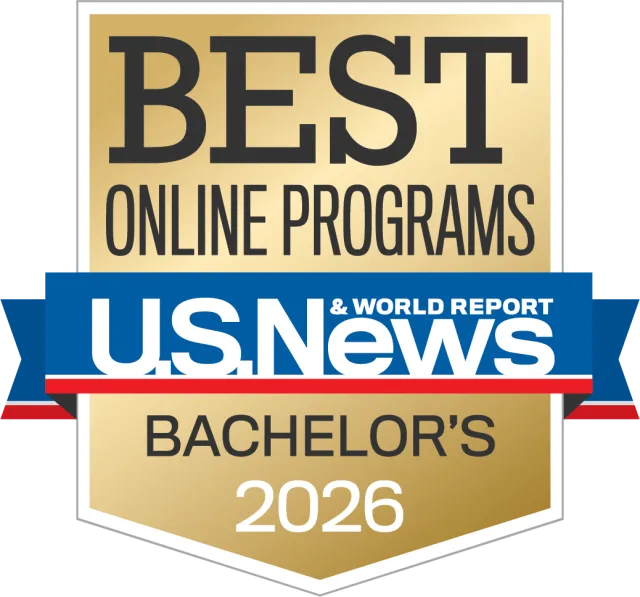
Ranked by U.S. News & World Report as one of the best online bachelor's programs in 2026
A BSN program that fits your lifestyle
The online degree program provides students with fundamental knowledge and skills in family nursing, medical-surgical nursing, nursing informatics, health assessment, and much more. Herzing's practical approach to partnering education and practice will help you gain and apply advanced nursing skills to move ahead in your nursing career.
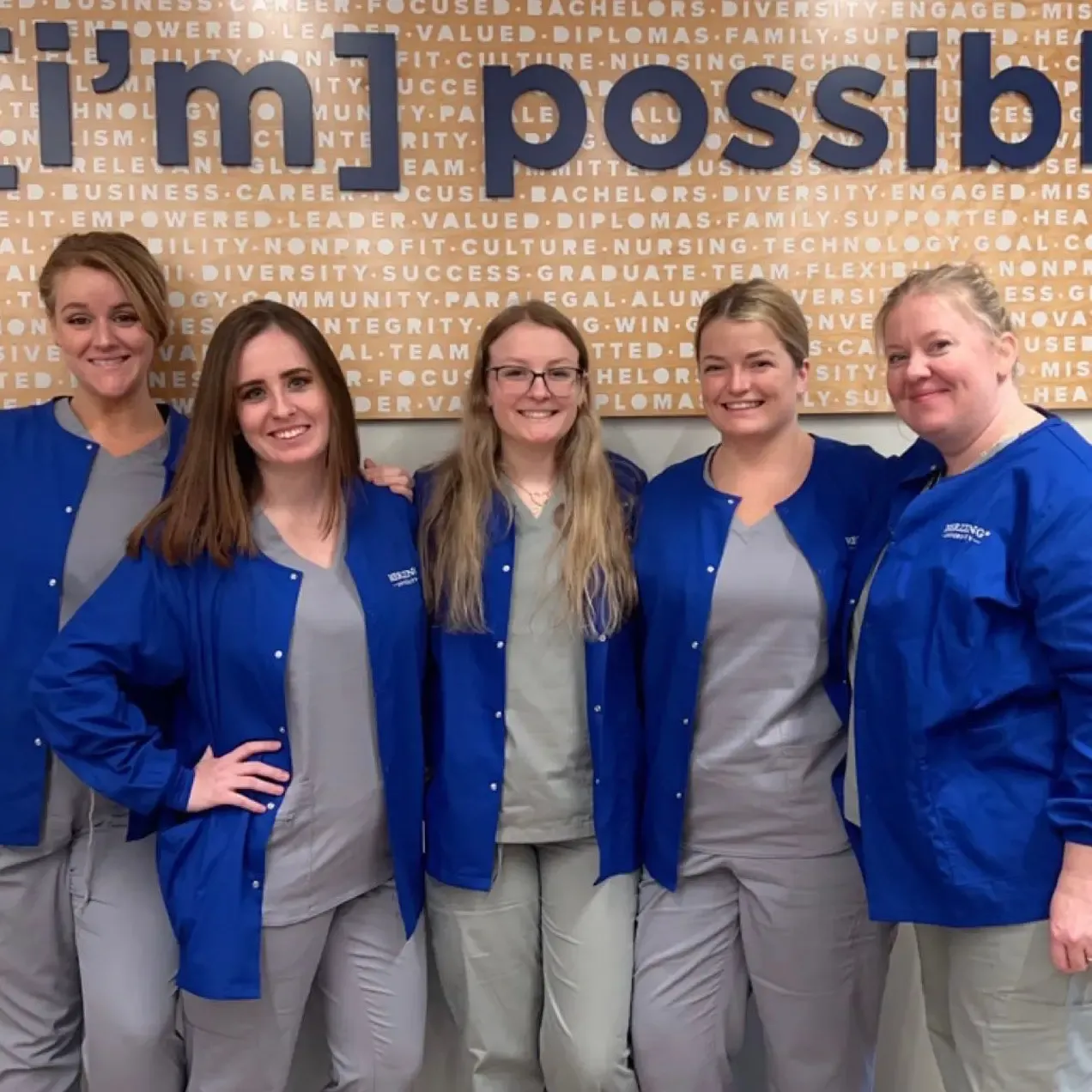
Career-focused curriculum
Discover the crucial knowledge and skills required to succeed in your work and build a foundation for continued career growth.
Flexible schedule
We work hard to help you maintain school-life balance, striving to be as flexible as possible for busy non-traditional students.
Virtual services
Access to extensive virtual services, including academic advising, tutoring, support services, technical support and library services.
Lifelong support
We support your ongoing career advancement by providing comprehensive, personalized student services with lifelong career coaching.
Rolling admissions
No application deadlines to worry about. Apply when you’re ready and prepare to get started soon.
Curriculum
Your pathway: classes and curriculum details
Every nursing course in our curriculum is designed to help you build a strong body of knowledge and skills to help pass the NCLEX-RN and get off to a fast, successful start in the field of nursing as an entry-level RN.
Students looking for a 2-year degree option may also consider our online associate in nursing degree program which is now available in select U.S. states.
All didactic (lecture) nursing courses in the program are delivered online through the Herzing University Canvas Learning Management System platform. Upon completing the program, you’ll be eligible to sit for the NCLEX-RN to earn licensure in your state.2
Flexibility for working adults
We work hard to support students who want to continue working while enrolled in the online BSN program. Maintaining full-time employment can be very challenging, but many of our students are able to successfully work part-time over the course of the program.
Some elements of the program have set dates and times which may be more restrictive, namely clinicals and intensives. However, online didactic courses and exams offer greater flexibility to complete at a time that’s right for you.
You have many university resources to assist in time management, ensuring you are able to maintain a healthy work-school-life balance.
| Program | Months i | Semester Credits |
|---|---|---|
| Bachelor of Science in Nursing (BSN) | 36 | 120 |
i. Average number of months needed to complete the program when attending full-time.
Required Courses in Nursing
All courses, 66.00 semester credit hours, are required.
Dual Credit Option for Taking Graduate Level Courses
Dual Credit Options are not available for New Orleans students. See Academic Information for full requirements under title Earning Graduate Credits as an Undergraduate Student. Undergraduate Course Graduate Course Equivalency NSG 321 Advanced Leadership and Management NU 730 Systems-Based Practice (Transferrable to MSN & DNP Programs) NSG 324 Evidence Based Practice in Nursing NU 602 Epidemiology, Research, and Theory (Transferrable to BSN to DNP Program Only) NSG 421 Nursing Informatics NU 725 Technology and Nursing Informatics in Advanced Practice (Transferrable to MSN & DNP Programs) NSG 423 Policy, Trends, & Ethics in Nursing HA 610 Health Policy and Management (Transferrable to MSN Program, except for MSNWHNP)
Required Courses in General Education
Students enrolled in the BSN program must complete a minimum of 52.00 semester credit hours in general education distributed among the following disciplines. A minimum of 9.00 semester credit hours must be upper level (300- to 400-level courses). The Herzing University General Education offerings are listed below. Refer to the General Education section of the catalog for additional information on general education requirement. 12.00 Semester Credit Hours in Communications EN 104 English Composition I EN 111 Information Literacy EN 116 Speech EN 304 English Composition II 16.00 Semester Credit Hours in Science SC 154 Anatomy and Physiology I for Nurses SC 254 Anatomy and Physiology II for Nurses SC 150 Principles of Nutrition SC 166 Microbiology SC 186 Chemistry 9.00 Semester Credit Hours in Humanities HU 140 Cultural Diversity HU 240 Introduction to Humanities HU 340 Humanities and Contemporary Popular Culture 6.00 Semester Credit Hours in Mathematics MA 109 College Algebra MA 320 Statistics 9.00 Semester Credit Hours in Social or Behavioral Science PS 101 Psychology PS 105 Developmental Psychology SS 350 Social Issues and Technology Note: Transfer students may transfer courses that are within 1.00 semester credit hour of the courses listed above to meet these discipline requirements. Any resulting deficiency in the total of 52.00 semester credit hours required in general education may be made up with general education electives from any of the listed disciplines. Science courses being transferred in from other institutions must meet the nursing program science requirements.
Special General Education Grading Requirements for Nursing Support Courses
The following science courses must be completed with a grade of "B" (80%) or better. Only two attempts are permitted for each course and a student who fails to successfully complete in the maximum attempts is subject to dismissal from the nursing program. SC 154 Anatomy and Physiology I for Nurses Semester Credit Hours: 4.00 SC 254 Anatomy and Physiology II for Nurses Semester Credit Hours: 4.00 The following general education courses must be completed with a grade of "C" (70%) or better for a student to continue in the nursing program. *BSN students enrolled in the Atlanta Campus require a "B" (80%) or better in SC 166 Microbiology and SC 186 Chemistry. PS 105 Developmental Psychology Semester Credit Hours: 3.00 SC 150 Principles of Nutrition Semester Credit Hours: 2.00 SC 166 Microbiology Semester Credit Hours: 3.00 SC 186 Chemistry Semester Credit Hours: 3.00 MA 109 College Algebra Semester Credit Hours: 3.00 MA 320 Statistics Semester Credit Hours: 3.00 A student who is dropped from the nursing program for failing to achieve the minimum grade specified in the courses listed above, but who otherwise meets the academic standards of the University may transfer to another Herzing degree program and/or may appeal to reapply to the BSN nursing program in a future semester.
Personal and Professional Development Courses
All courses, 2.00 semester credit hours, are required.
Resuming students should refer to the section on re-entering for additional requirements.
Distribution of Contact Hours by Course
Distribution of Contact Hours by Course Course or Category Lecture Lab Clinical Total Contact Hours Credits NSG 120 45.00 45.00 3.00 NSG 121 30.00 30.00 60.00 3.00 NSG 122 45.00 30.00 45.00 120.00 5.00 NSG 123 45.00 135.00 180.00 6.00 NSG 124 45.00 45.00 3.00 NSG 221 45.00 45.00 90.00 4.00 NSG 222 60.00 90.00 150.00 6.00 NSG 223 60.00 90.00 150.00 6.00 NSG 321 45.00 45.00 3.00 NSG 323 60.00 45.00 105.00 5.00 NSG 324 45.00 45.00 3.00 NSG 421 45.00 45.00 3.00 NSG 233 45.00 30.00 45.00 120.00 5.00 NSG 423 45.00 45.00 3.00 NSG 425 30.00 135.00 165.00 5.00 NSG 426 45.00 45.00 3.00 EN 101 45.00 45.00 3.00 EN 111 45.00 45.00 3.00 EN 116 45.00 45.00 3.00 EN 304 45.00 45.00 3.00 SC 150 30.00 30.00 2.00 SC 166 30.00 30.00 60.00 3.00 SC 186 30.00 30.00 60.00 3.00 SC 154 45.00 30.00 75.00 4.00 SC 254 45.00 30.00 75.00 4.00 MA 109 45.00 45.00 3.00 MA 320 45.00 45.00 3.00 HU 140 45.00 45.00 3.00 HU 240 45.00 45.00 3.00 HU 340 45.00 45.00 3.00 PS 101 45.00 45.00 3.00 PS 105 45.00 45.00 3.00 SS 350 45.00 45.00 3.00 PD 121 15.00 15.00 1.00 PD 202 15.00 15.00 1.00 Totals 1485.00 210.00 630.00 2325.00 120.00
Online & In person
What's Online, and What's In-person?
Online
All didactic (lecture) courses are asynchronous, meaning you can complete them online on your own schedule.
You have flexibility throughout the program to complete general education at your own pace.
Practicum instructor and peer collaboration requirements will be done via distance learning and offer flexible scheduling for the synchronous, or real-time, course elements.
In-person
Practical, hands-on training remains crucial and required preparation for earning a BSN and becoming a registered nurse. Our curriculum includes:
- Clinicals. We use traditional faculty-led rotations and/or a precepted model for student clinical experiences. You’ll complete clinical hours in or near your geographic area. We have a dedicated team to help you find clinical placement.
- Intensives. You’ll be required to attend three 2-4 day intensives throughout the program. These sessions serve as crucial skill and knowledge checkpoints to ensure you’re on the right track. Intensives will take place at our Brookfield, WI or Nashville, TN campuses—or a facility associated with a unique clinical partnership.
Tuition & Cost
Tuition & Cost
The cost of tuition for the online BSN program is $755 per credit.
You can potentially earn even greater savings by transferring credit from prior college coursework, applying for financial aid, or potential partnership opportunities through your employer.
Our goal is your career advancement. That’s why we are always working to improve our curriculum and processes to make our program as affordable as possible while preparing you best for success in your work.
Scholarships & Financial Aid
You may be eligible for multiple scholarships and grants—including our Nurses Circle of Achievement scholarship, which offers up to 10% tuition reduction.
Military/Veteran Discounts
Veterans, Active Duty U.S. Servicemembers, and spouses may qualify for a 10-20% tuition discount.
Admissions Requirements
Requirements for enrollment in the Herzing University online Bachelor of Science in Nursing program include both a GPA requirement and minimum benchmark scores on the Test of Essential Academic Skills (TEAS):
Direct Entry BSN enrollment requirements
Prior education
High school diploma or equivalent
Minimum GPA
2.5
Minimum TEAS score
66
Students with 24 or more transferable collegiate credits will be assessed on their collegiate cumulative GPA. Otherwise, the high school GPA will be used.
Eligible states for enrollment:
- Coloradoi
- Florida
- Illinois
- Indiana
- Iowai
- Kansasi
- Kentucky
- Michigan
- Missouri
- North Carolina
- Ohio
- Oklahomai
- South Carolina
- South Dakotai
- Tennessee
- Texasii
- Virginia
- Wisconsin
iAt this time, we have reached full enrollment capacity for prelicensure nursing students from Colorado, Iowa, Kansas, Oklahoma, and South Dakota. We carefully manage enrollment to ensure a high-quality educational experience for every student. Please check back for future updates to enrollment status.
iiAustin, Dallas, Houston, San Antonio, and Waco regions only
I don’t meet the enrollment requirements. Do I have any other options?
Yes! You still have multiple educational pathways to becoming an RN even if you don’t qualify for the Online BSN program today:
Waived Enrollment Fee
Discover the educational pathway designed to maximize your career potential. Reach for greater heights with Herzing University.
Alternative online BSN pathways with Herzing University
Our pre-licensure online BSN program is designed for students without any experience in nursing. However, we offer additional online options for those who are already in nursing or currently work in additional select healthcare professions.

Go from RN to BSN
Current diploma/ADN nurses can earn a BSN faster in our online RN to BSN program, which can be completed in as few as 12 months.
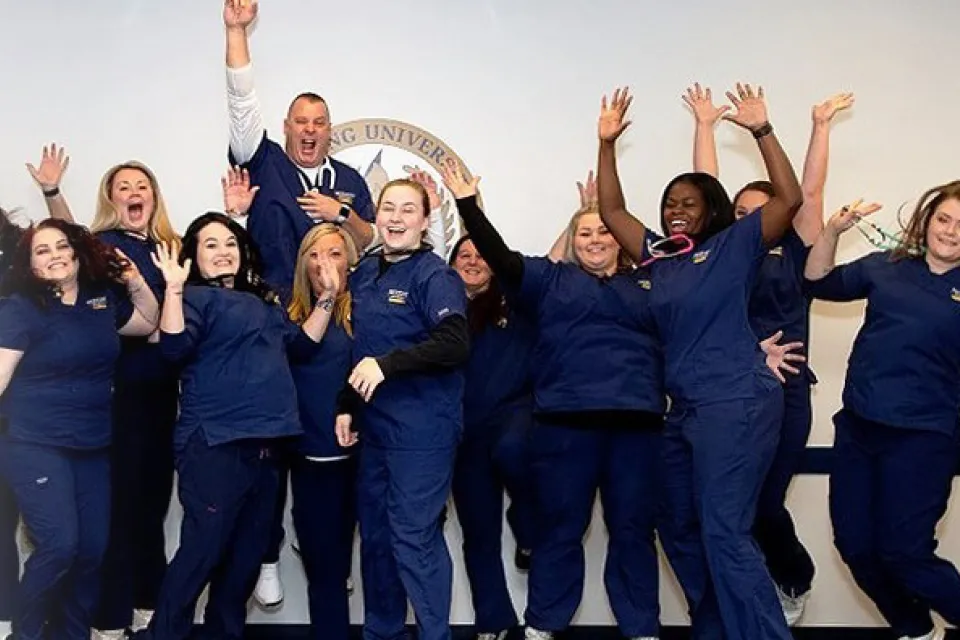
Go from LPN to BSN
Advance your nursing career to the next level. Utilize your current experience as a Licensed Practical or Vocational Nurse (LPN/LVN) and you can earn a BSN online in less than 3 years.
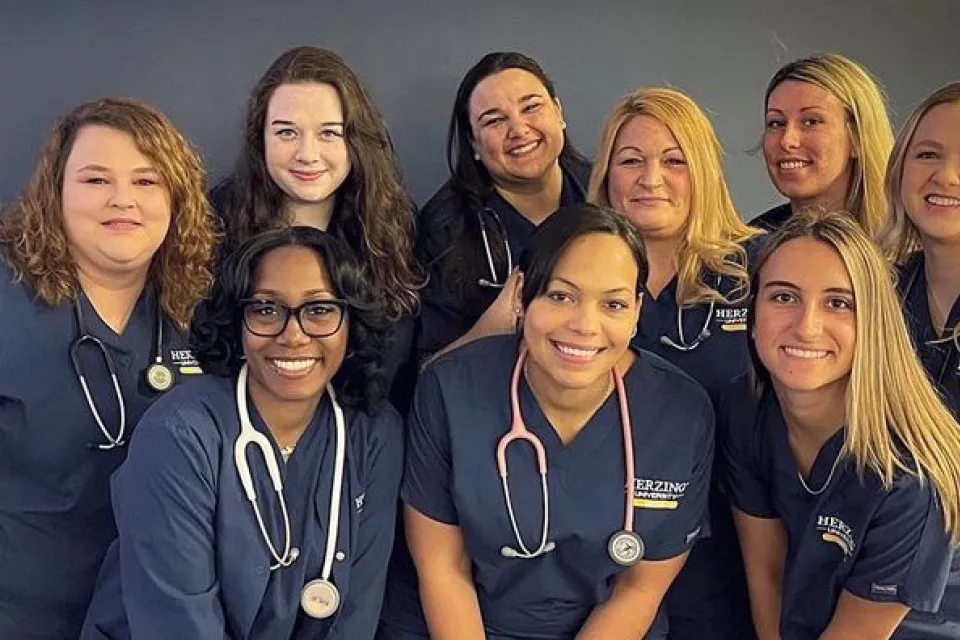
Bridge to a BSN
Paramedics, respiratory therapists, cardiovascular technologists, and military medics can also potentially earn a BSN faster in our online BSN Bridge option.
Find your calling as a registered nurse
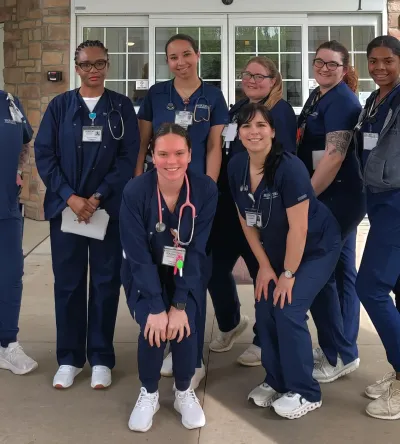
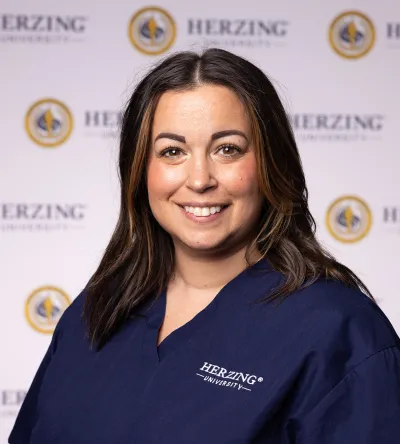
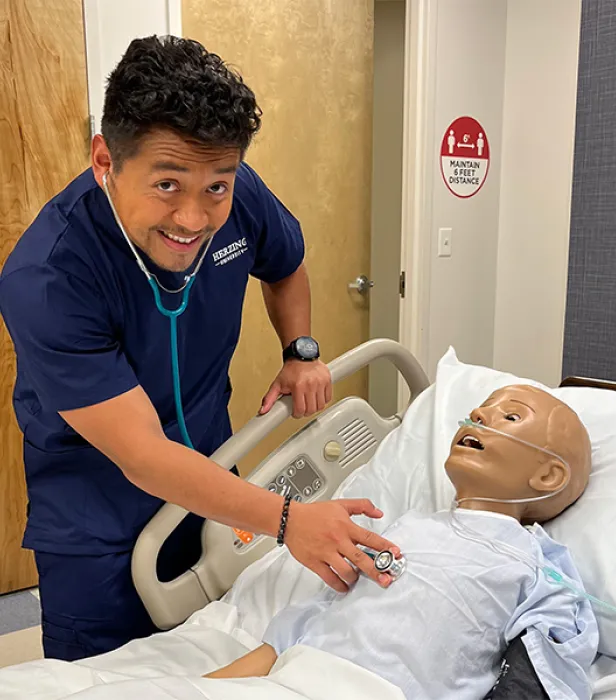
You can explore many different career opportunities as a BSN-prepared RN.
While earning a Master of Science in Nursing (MSN) can expand your duties to advanced practice across many specialties, you can also pursue different specialty roles with a BSN, including pediatrics, neonatal/NICU, oncology, neuroscience, Operating Room (OR)/surgical, and much more.
With enough experience you may consider advancing to roles in nursing education or nursing leadership. Keep in mind degree requirements may vary, including an MSN or Doctor of Nursing Practice (DNP).
We offer degree pathways to help you reach as high as you want to climb in the field of nursing.
Salary and job outlook
According to the Bureau of Labor Statistics, employment of registered nurses is expected to rise 5% from 2024-2034, higher than the expected average across all U.S. occupations.*
Now is an excellent time to pursue a degree qualifying you for jobs in a growing field with numerous opportunities for career advancement.
Faq
Frequently Asked Questions
Didn't find the answer to your question? Send us an inquiry and we will be happy to answer all your questions!
The BLS projects a 9% increase in need for registered nurses from 2020-2030*. RNs are in high demand, and earning a BSN can help your resume stand out and give you a better chance of getting the job you really want.
As the popularity of online degrees continues to rapidly trend upward in the wake of the COVID-19 pandemic, so has mainstream acceptance of online degree programs.
Attitudes toward online degrees were already becoming more positive before the pandemic forced the issue. According to a 2019 study from Northeastern University, 61 percent of HR leaders say online learning is “of equal or greater quality to more traditional methods.” More than half believe that in the future, most advanced degrees will be online.
Regarding nursing applicants who earned online degrees, there are a few important factors employers consider:
- The school and degree program’s accreditation. Herzing University is accredited by the Higher Learning Commission (HLC) and programmatically accredited by the Commission on Collegiate Nursing Education (CCNE).1
- If you have earned nursing licensure. Our program is designed to help you pass the NCLEX and become licensed before getting your first job.
- The school’s reputation and history of producing excellent employees. Consider our many happy graduates and 50+ years producing more than 40,000 alumni.
- What your goals are
- How quickly you want to reach them
If your goal is to become an RN and potentially advance further by working towards a master’s degree in nursing (MSN), your best option is a bachelor’s degree in nursing program.
Read about the most basic differences between ADN vs. BSN and discover what's best for you.
- Enroll in a Pre-Nursing associate degree program. We’ve developed an Associate of Science/Associate of Applied Science in General Studies in Pre-Nursing curriculum specifically designed to help you improve your GPA and qualify for a BSN program in the future. Our minimum GPA requirements is 2.25, with availability through our Atlanta, Brookfield, Kenosha, Madison, Minneapolis, Orlando and Tampa campuses.
- Enroll in an Associate of Science in Nursing (ASN/ADN) program. You can qualify for the NCLEX-RN by earning an associate degree in nursing. Our minimum GPA requirement is 2.5, with campus availability in Akron, Birmingham, Clarksville, Nashville, Orlando, and Tampa.
- Enroll in a Practical Nursing Diploma program (LPN/PN). As an alternative, you may consider becoming a practical nurse. You can earn a diploma in as few as 12 months and qualify to take the NCLEX-PN exam. Our minimum GPA requirement is 2.0, with campus availability in Akron, Birmingham, Brookfield, Clarksville, Kenosha, Madison, Orlando and Tampa.
A BSN is a step up from an associate in nursing (ADN/ASN) and can offer further job opportunities for nurses seeking a particular specialty or are looking ahead to earning a master’s degree in nursing (MSN).
However, if your goal is to continue climbing the ladder to become a nurse practitioner or pursue roles in nursing leadership or administration, you may be best off enrolling in a BSN program so you can reach your goals faster.
No matter what you choose, Herzing is here to empower you to become the best nursing professional you can be.
- Increased autonomy in decision making while on the job
- Open doors to more specialties in the nursing field
- Become a more attractive candidate for hospitals seeking Magnet Recognition
- Build a foundation to grow into education or leadership pathways
- Positions you better for nursing jobs with higher pay
- Qualify to enroll in an MSN program
- Become more familiar and educated with evidence-based practice opportunities
- Increase knowledge and understanding of RN specialties and skills
- Transition from “technical” to “professional” RN
- Gain a deeper knowledge of nursing theory and leadership theory
The ultimate benefit is bettering yourself, becoming the best nurse you can be and following the career path of your choosing.
- Diploma in Practical Nursing. The fastest way to start your nursing career is to earn a diploma in practical nursing and become a Licensed Practical Nurse. This isn’t a “degree” but it’s an alternative starting point if you’re ready to get your feet wet in nursing.
- Associate degree in nursing. Earn an associate’s degree in nursing and you’ll be eligible to site for the NCLEX and become a Registered Nurse (RN).
- Bachelor’s in nursing. A bachelor’s degree is becoming the new educational standard for registered nurses, and it will qualify you for a master’s degree program.
- Master’s in nursing. Many roles up the ladder in nursing will require a master’s degree.
We offer online associate, bachelor's, and master's degree pathways for those without nursing experience looking to become an RN. Eligibility varies by state of residence.
Learn more about our online nursing programs designed for non-nurses.
Our online BSN program provides clinical experiences through traditional faculty-led rotations and/or a precepted model.
Upon admission, you will complete a form to help guide your clinical placement. This includes identifying local sites where you would like to complete clinical hours or locations of potential career interest.
Our clinical placement team will assist with securing a preceptor or placing you in a faculty-led rotation. We partner with a variety of clinical sites, ideally within 100 miles of your location. While student input is valuable, specific placements or preceptors cannot be guaranteed.
Meeting all clinical preparedness requirements is mandatory prior to placement. This includes immunizations, background checks, drug screening, CPR certification, and site-specific onboarding, as applicable.
Some clinical components, such as basic skills checks or faculty advisement, may be completed virtually through synchronous sessions.
The Student Experience at Herzing
The faculty here make themselves available during their designated office hours, but if you need extra help, they will meet at times that will work for YOU.
Barbara Mulcahy
Nursing Student | Madison CampusI was looking for a nursing program that would accommodate my schedule where I didn’t feel rushed. I feel like I really learned a lot of valuable information!
Monica Romero Pina
Nursing Student | Kenosha CampusI was so much more confident in my interviewing abilities because of the amazing people, the professors, the other students, and the entire career center.
Fabio and Felicia Giraldo
Nursing Student | Orlando CampusWhen I first learned about Herzing University, I had already been working as a certified nurse’s assistant (CNA) for eight years. I loved the job, but I felt that I had potential to become something more. My co-workers encouraged me to become a registered nurse and told me about Herzing’s BSN program. I knew that nursing was the right career for me, so I enrolled and was able to start right away!
Nabeela Rehan
Nursing Student | Brookfield/Milwaukee CampusWhat I liked most about my experience at Herzing University were the faculty members. They made it feel like it was family here.
Wanda Colon
Nursing Student | Orlando CampusHerzing offered the classes I needed to obtain my degree in the shortest time possible. Herzing even allowed me to transfer prior credits that other colleges would not accept.
Tanya Nicole Anderson
Nursing Student | Online CampusAccreditation & Disclosures
1. The baccalaureate degree program in nursing at Herzing University Madison is accredited by the Commission on Collegiate Nursing Education (http://www.ccneaccreditation.org). Herzing University is approved to offer programs in an online learning modality through association with the main campus in Madison, Wisconsin.
2. Eligible states for enrollment: Colorado, Florida, Illinois, Indiana, Iowa, Kansas, Kentucky, Michigan, Missouri, North Carolina, Ohio, Oklahoma, South Carolina, South Dakota, Tennessee, Texas (Austin, Dallas, Houston, San Antonio, and Waco regions only), Virginia and Wisconsin.
At this time, we have reached full enrollment capacity for prelicensure nursing students from Colorado, Iowa, Kansas, Missouri, Oklahoma, and South Dakota. We carefully manage enrollment to ensure a high-quality educational experience for every student. Please check back for future updates to enrollment status.
Herzing University is accredited by the Higher Learning Commission (hlcommission.org), an institutional accreditation agency recognized by the U.S. Department of Education.
* BLS pay estimates calculate the median annual wage for various occupations. Per the BLS the median wage for an occupation is: "The wage at which half of the workers in the occupation earned more than that amount, and half earned less. Median wage data are from the BLS Occupational Employment and Wage Statistics survey." Bureau of Labor Statistics (BLS), U.S. Department of Labor, Occupational Outlook Handbook 2024. BLS median wage estimates do not represent entry-level wages and/or salaries. Multiple factors, including prior experience, age, geographic market in which you want to work, and degree level and field, will affect career outcomes, including starting salary and earnings as an experienced employee. Herzing neither represents that its graduates will earn the median salaries calculated by BLS for a particular job nor guarantees that graduation from its program will result in a job, promotion, particular wage or salary, or other career growth.
Recent Blog Posts
Waived Enrollment Fee
Discover the educational pathway designed to maximize your career potential. Reach for greater heights with Herzing University.

